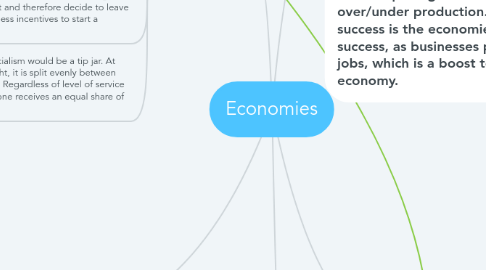Economies
by Kayty Ogren

1. Socialism
1.1. Some to most businesses are owned by the government so they can distribute the profits to the people. They believe in equality and offer many free social programs such as college and healthcare.
1.2. Pros: Their main goal is equality. They offer more socially minded services for free, such as college, healthcare, and childcare. Workers in their county have fewer work hours, more benefits, and longer vacations.
1.3. Cons: They have very high taxes to pay for all the free social programs. These high taxes have led to "brain drain" as the best and the brightest are taxed the most and therefore decide to leave the country. Also, less incentives to start a business.
1.4. An example of socialism would be a tip jar. At the end of the night, it is split evenly between all the employees. Regardless of level of service or position, everyone receives an equal share of the money.
2. Capitalism
2.1. Pros: Freedom to own property and/or a business, to compete with a business/individual, and freedom of choice, like where to live, work, or go to school.
2.2. Cons: Financial inequality and limited number of social services.
2.3. Production and distribution are privately owned, operated for profit, and companies decide what to make, how much, and employee wages.
2.3.1. An example of Capitalism would be the United States. The American motto is life, liberty, and the pursuit of happiness. In this country, everyone is entitled to use the freedoms a capitalist economy offers, if they wish to.
3. Communism
3.1. Economic and political system, similar to socialism, but a higher level of government interference. The government makes most of the economic decisions and owns most businesses.
3.2. Like socialism, communism focuses on equality and sharing the wealth. They have a flat tax rate of 13%, which prevents high taxes like seen in socialist countries.
3.3. An extreme level of government control. You are not allowed to move, change jobs, go to school, and, in some communist countries, practice the religion of your choice, without government permission. Having an economy under government control can lead to a shortage of goods and services.
3.4. An example of communism is a citizen of China. They will go to the same job every day, no hope of promotion or a raise. They will go home to same place every night, no hope of moving. No chance to better themselves, no religious freedom. Day after day, year after year, with no way to change their situation.
4. The United States has a mixed economy based on capitalism. While we are entitled to all the freedoms that come with capitalism, we also have some of the social programs associated with socialism, such as free or low-cost healthcare, SNAP benefits, and social security.
5. Economic systems are important because without one, it would be chaos. In socialist and communist societies, it helps to achieve their goal of equality by sharing the wealth and creating a set of standards for their citizens to follow. In a capitalist free market, it controls the production and prices of goods and services to satisfy consumer needs. This is important for businesses so they can profit from their goods/services by not overpricing or having an over/under production. Their success is the economies success, as businesses provide jobs, which is a boost to the economy.


